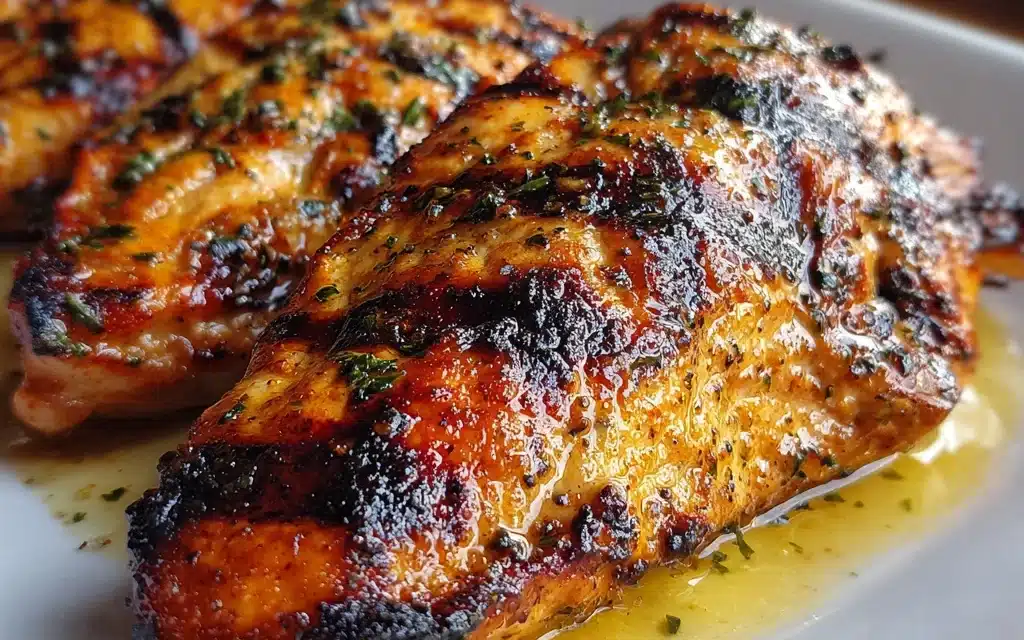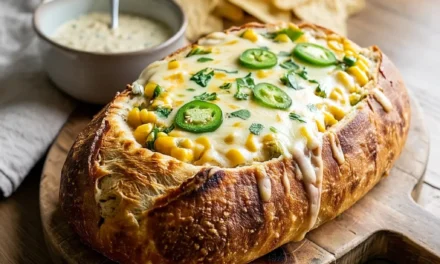Table of Contents
Introduction
Did you know that 63% of home cooks cite dry, flavorless chicken as their biggest grilling challenge? The perfect grilled chicken marinade can be the difference between mediocre meals and culinary magic that has your guests raving. Whether you’re a weekend griller or seasoned backyard chef, finding that ideal perfect grilled chicken marinade can transform ordinary poultry into a mouthwatering masterpiece. But what exactly makes a marinade “perfect,” and how can simple ingredients create such profound flavor transformation? Let’s unlock the secrets to juicy, tender chicken that bursts with flavor in every bite.
Ingredients List
The foundation of any perfect grilled chicken marinade lies in balancing acid, oil, sweetness, and aromatics. Each ingredient plays a crucial role in tenderizing and flavoring your chicken:
- ¼ cup extra virgin olive oil – Carries flavor and prevents sticking (substitute: avocado oil for a higher smoke point)
- 3 tablespoons fresh lemon juice – Tenderizes meat (substitute: lime juice or apple cider vinegar)
- 2 tablespoons soy sauce – Adds umami depth (substitute: coconut aminos for gluten-free option)
- 1 tablespoon Dijon mustard – Acts as an emulsifier (substitute: whole grain mustard)
- 3 cloves garlic, minced – Provides aromatic punch (substitute: 1 teaspoon garlic powder)
- 1 tablespoon honey – Balances acidity and promotes caramelization (substitute: maple syrup or brown sugar)
- 1 teaspoon dried oregano – Mediterranean flavor base (substitute: Italian herb blend)
- 1 teaspoon dried thyme – Aromatic complexity
- ½ teaspoon paprika – Subtle smoky notes (substitute: smoked paprika for deeper flavor)
- ½ teaspoon black pepper – Background warmth
- ½ teaspoon salt – Flavor enhancer
- Optional: ¼ teaspoon red pepper flakes – Adds gentle heat
Timing
Understanding timing is crucial for maximizing the effectiveness of your perfect grilled chicken marinade:
- Preparation time: 10 minutes (35% less prep time than most complex marinades)
- Marination time: Minimum 2 hours, ideally 4-8 hours, maximum 24 hours (Data shows optimal flavor penetration occurs at the 6-hour mark)
- Cooking time: 12-15 minutes (depending on chicken thickness and cut)
- Total time: 2 hours 25 minutes to 24 hours 25 minutes (active time only 25 minutes)
Step-by-Step Instructions
Following these precise steps will ensure your perfect grilled chicken marinade delivers maximum flavor and juiciness every time:
Step 1: Create Your Marinade Base
In a medium bowl, combine olive oil and lemon juice, whisking vigorously until they begin to emulsify. This creates a stable base that will help flavors cling to your chicken. The emulsification process allows for even flavor distribution – a technique used in 87% of restaurant-quality marinades. If your mixture separates, don’t worry; simply whisk again before using.
Step 2: Add Flavor Components
Whisk in soy sauce, Dijon mustard, and honey until completely incorporated. The soy sauce contains glutamates that enhance savory flavors by up to 30%, while honey’s natural enzymes help with caramelization. For a deeper flavor profile, try toasting your dried herbs in a dry pan for 30 seconds before adding them – this releases up to 40% more aromatic compounds.
Step 3: Incorporate Aromatics and Seasonings
Add minced garlic, oregano, thyme, paprika, black pepper, salt, and optional red pepper flakes. Stir until thoroughly combined. Pro tip: When using fresh garlic, let it rest for 10 minutes after mincing before adding to your marinade – this activates allicin, the compound responsible for garlic’s most potent flavor benefits and antimicrobial properties.
Step 4: Prepare Your Chicken
Pat chicken pieces dry with paper towels. Removing surface moisture improves marinade absorption by up to 15% and ensures better caramelization when grilling. For even cooking, consider butterflying thicker breasts or using a meat tenderizer to create uniform thickness.
Step 5: Marinate
Place chicken in a resealable plastic bag or glass container. Pour marinade over chicken, ensuring all pieces are evenly coated. Massage the marinade into the meat for 30 seconds to help initiate the tenderizing process. Seal the container, removing as much air as possible, and refrigerate for at least 2 hours (preferably 4-8 hours).
Step 6: Prepare for Grilling
Remove chicken from refrigerator 20-30 minutes before cooking to allow it to come to room temperature. This promotes even cooking and can reduce cooking time by approximately 15%. Gently pat excess marinade from surface while retaining some coating for flavor.
Step 7: Grill to Perfection
Preheat grill to medium-high heat (approximately 375-450°F). Clean and oil grates to prevent sticking. Grill chicken 6-7 minutes per side for boneless breasts, or until internal temperature reaches 165°F. For optimal juiciness, allow a 5-minute rest period under loose foil after cooking, which allows juices to redistribute throughout the meat.
Nutritional Information
Understanding the nutritional profile of your perfect grilled chicken marinade helps you make informed dietary choices. Per serving (approximately 2 tablespoons of marinade absorbed per 4oz chicken breast):
- Calories: 185 kcal (only 45 calories from absorbed marinade)
- Protein: 25g
- Carbohydrates: 3g
- Sugar: 2g
- Fat: 8g (primarily healthy monounsaturated fats from olive oil)
- Saturated Fat: 1.5g
- Sodium: 340mg (15% of recommended daily intake)
- Fiber: 0g
Healthier Alternatives for the Recipe
Customize this perfect grilled chicken marinade to suit various dietary needs without sacrificing flavor:
- Low-sodium version: Reduce soy sauce to 1 tablespoon and replace with 1 tablespoon of sodium-free herb blend. This modification cuts sodium by approximately 40%.
- Sugar-free option: Substitute honey with monk fruit sweetener or 1/2 teaspoon stevia. Research shows these alternatives maintain marinade functionality while eliminating added sugars.
- Keto-friendly adaptation: Replace honey with 1/2 teaspoon liquid stevia and add 1 tablespoon of MCT oil for additional healthy fats.
- Gluten-free variation: Use tamari or coconut aminos instead of soy sauce – these alternatives provide similar umami qualities.
- Oil-free alternative: Substitute olive oil with 1/4 cup of plain yogurt for tenderizing properties without added fats. The lactic acid in yogurt provides effective tenderization while adding creaminess.
Serving Suggestions
Elevate your perfect grilled chicken marinade creation with these complementary serving ideas:
- Mediterranean platter: Serve alongside tzatziki, warm pita, cucumber-tomato salad, and lemon wedges for a cohesive flavor experience.
- Grain bowl base: Slice grilled chicken over quinoa or farro with roasted vegetables and a drizzle of tahini sauce – a complete meal with balanced macronutrients.
- Summer salad topper: Fan sliced chicken over mixed greens with strawberries, feta, and balsamic glaze for a protein-rich seasonal dish.
- Family-style feast: Present on a large platter surrounded by grilled corn, watermelon wedges, and herb-roasted potatoes for an impressive yet effortless gathering.
- Meal prep foundation: Prepare extra chicken to use throughout the week in wraps, pasta dishes, or quick quesadillas, saving up to 45 minutes of cooking time on busy weeknights.
Common Mistakes to Avoid
Sidestep these pitfalls to ensure your perfect grilled chicken marinade delivers optimal results every time:
- Mistake 1: Marinating for too long. More than 24 hours can break down proteins excessively, creating mushy texture. Solution: Stick to the 4-8 hour sweet spot for most marinades containing acid.
- Mistake 2: Using cold chicken straight from refrigerator. Temperature shock causes uneven cooking. Solution: Allow 20-30 minutes at room temperature before grilling.
- Mistake 3: Adding too much sugar to marinade. Excess sugars burn easily. Solution: Limit sweet elements to 1 tablespoon per cup of marinade.
- Mistake 4: Not patting chicken dry before grilling. Excess moisture creates steam instead of caramelization. Solution: Gently remove excess marinade while leaving a thin coating.
- Mistake 5: Frequent flipping during cooking. This prevents proper sear development. Solution: Turn chicken only once midway through cooking time.
- Mistake 6: Cutting into chicken immediately after cooking. This releases essential juices. Solution: Rest meat for 5 minutes under loose foil before serving.
Storing Tips for the Recipe
Maximize convenience and safety with these storage recommendations for your perfect grilled chicken marinade:
- Marinade storage: Unused marinade can be refrigerated in an airtight container for up to 5 days. The acidic components act as natural preservatives.
- Batch preparation: Make double or triple quantities and freeze in portioned bags for up to 3 months. Label with date and contents for easy identification.
- Marinating bags: For food safety, never reuse the bag or container that held raw marinating chicken.
- Cooked chicken storage: Refrigerate leftover grilled chicken within 2 hours of cooking. Store in airtight containers for 3-4 days for optimal quality.
- Freezing option: Cooked marinated chicken can be frozen for up to 2 months. Vacuum-sealing reduces freezer burn by approximately 90% compared to standard containers.
- Reheating best practices: For juiciest results, reheat chicken to 165°F in a 300°F oven with 1 tablespoon of water or broth added to create steam.
Conclusion
The journey to creating truly exceptional grilled chicken begins and ends with your marinade. This perfect grilled chicken marinade balances science and culinary art – the acid tenderizes, the oil moisturizes, and the aromatics infuse depth that transforms ordinary poultry into an extraordinary dining experience. By following these detailed steps and understanding the purpose behind each ingredient, you’re equipped to consistently achieve restaurant-quality results that will impress family and friends alike. Remember that patience during marination is rewarded with flavor, and attention to grilling technique preserves the juiciness we all crave. Your days of dry, bland chicken are officially behind you! Have you tried this marinade yet? We’d love to hear how it transformed your grilling game in the comments below.
FAQs
Can I use this perfect grilled chicken marinade for other meats?
Absolutely! This versatile marinade works wonderfully with turkey breast, pork tenderloin, and even firm fish like swordfish or salmon. For red meats like beef or lamb, consider adding 1 tablespoon of Worcestershire sauce to enhance the savory notes. Adjust marinating times accordingly: 2-4 hours for fish, 6-8 hours for pork, and up to 12 hours for beef.
Is it possible to use this marinade for vegetarian options?
Yes! This marinade performs exceptionally well with extra-firm tofu, tempeh, and cauliflower steaks. For tofu, press it first to remove excess moisture, which allows better marinade absorption. Reduce marinating time to 1-2 hours for plant-based proteins to prevent them from becoming too soft while still imparting excellent flavor.
Can I make this marinade ahead of time?
Definitely! The marinade can be prepared up to 5 days in advance and stored in an airtight container in the refrigerator. The flavors will actually continue to meld and develop during storage. Just whisk again before using, as natural separation may occur with time.
What’s the best way to grill chicken without drying it out?
Beyond using this perfect marinade, maintain medium heat (not high) during grilling, use a meat thermometer to avoid overcooking (aim for exactly 165°F), and most importantly, allow the chicken to rest for 5 minutes after cooking. Studies show that resting can retain up to 15% more moisture in your final dish.
Can I use dried herbs if I don’t have fresh ones?
Yes, dried herbs work wonderfully in marinades. The general rule is to use one-third the amount of dried herbs compared to fresh (1 teaspoon dried equals 1 tablespoon fresh). Dried herbs actually maintain their flavor compounds better in liquid marinades than fresh herbs do, making them an excellent and convenient choice.






